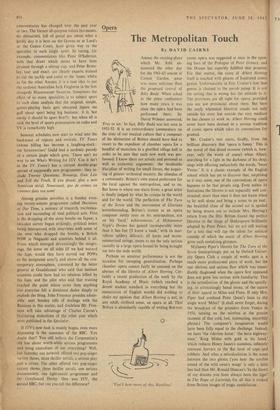Opera
The Metropolitan Touch
By DAVID CAIRNS AMONG the exciting plans' which Mr. Solti an- nounced the other day for the 1961-62 season at Covent Garden, none was more welcome than the proposed revival of Billy Budd. When asked at the press conference how many years it was since the opera had been performed there, Sir David Webster answered, 'Five or six.' In fact, Billy Budd was last seen in 1951-52. It is an extraordinary commentary on the state of our musical culture that a composer • of the distinction of Britten should have had to resort to the expedient of chamber opera for a handful of musicians in a glorified village hall in order to be sure that each new work was per- formed. I know there are artistic and personal as well as economic arguments: the invaluable discipline of writing for small forces, the acquir- ing of greater orchestral mastery, the stimulus of a community, Britten's own stated preference for the local against the metropolitan, and so on. But home is where one starts from; a great artist is finally judged by what he creates in the world and for the world. The perfection of The Turn of the Screw and the unevenness of Gloriana notwithstanding. Britten's stature as an opera composer surely rests on his metropolitan, not on his 'local,' achievements. A Midsummer Night's Dream has gained incomparably more than it has lost ('I know a bank,' with its mar- vellous spidery delicacy, all harps and moon- mesmerised strings, seems to me the only serious casualty in a large opera house) by being brought out into the wide world.
Perhaps an amateur performance is not the occasion for sweeping generalisation. Perhaps chamber opera cannot fairly be assessed on the abysses of the libretto of Albert Herring. Cer- tainly a recent production of the work by the Royal Academy of Music (which reached a decent student standard in everything but the enunciation of English words) did nothing to shake my opinion that Albert Herring is not, in any adult, civilised sense, an opera at all. That Britten is abundantly capable of writing first-rate
'You'll hear more of this, Hawkins.'
comic opera was suggested at once in the open- ing bars of the Prologue of Peter Grimes; and the Dream has superbly fulfilled that promise. For that matter, the score of Albert Herring itself is touched with gleams of frustrated comic genius. Unfortunately in Eric Crozier's text that genius is chained to the parish pump. It is not the setting that is wrong but the attitude to it. The provinces are all right for opera. provided you are not provincial about them. But here the coyly whimsical librettist stands not only outside his story but outside the very medium he has chosen to work in. Albert Herring could never have been devised in a serious tradition of comic opera which takes its conventions for granted.
Mr. Crozier's text starts, fatally, from the brilliant discovery that 'opera is funny.' This is the moral of that dread moment (which is, how- ever, only the worst of many) when Albert, searching for a light in the darkness of his shop, sings with affecting melancholy the words, 'Swan Vestas.' It is a classic example of the English school which has yet to discover that, surprising as it may seem, one of the conventions of opera happens to be that people sing. Even within its limitations the libretto is not especially welt con- structed; more than once it does not know when to let well alone and bring a scene to an end: the beautiful close of the second act is spoiled by being drawn out to include Mrs. Herring's return from the fete. Britten found the perfect ,librettist in the shape of Shakespeare brilliantly adapted by Peter Pears; but we are still waiting for a text that will tap the talent for satirical comedy of which the music of Albert Herring gives such tantalising glimpses.
Myfanwy Piper's libretto for The Turn of the Screw (enterprisingly put on by Oxford Univer- sity Opera Club a couple of weeks ago) is a much more professional piece of work, but the one obvious and serious flaw which was imme- diately diagnosed when the opera first appeared does not grow less serious with familiarity. This is the actualisation of the ghosts and the specify- ing, in astonishingly banal terms, of the nature of their appeal to Miles and Flora. If only Mrs. Piper had confined Peter Quint's lines to the single word 'Miles!' (I shall never forget, during the broadcast of the premiere from Venice in 1954, turning on the wireless at the precise moment of that cold, lost, insinuating, unearthly phrase.) The composer's imagination would have been fully equal to the challenge. Instead, we have 'the riderless horse,' the hero highway- man,' King Midas with gold in his hand,' which reduces Henry James's nameless, infinitely resonant horrors to the flat level of cops and robbers. And what a miscalculation is the scene between the two ghosts ('you hear the terrible sound of the wild swan's wings' is only a little less bad than Mr. Ronald Duncan's 'In the forest of my dreams you have always been the tiger' in The Rape of Lucretia), for all that it evoked from Britten images of tragic annihilation.


































 Previous page
Previous page